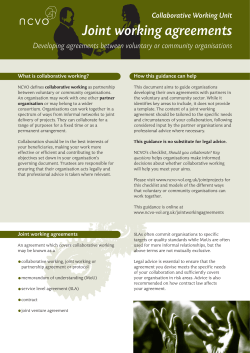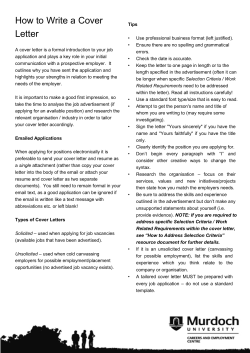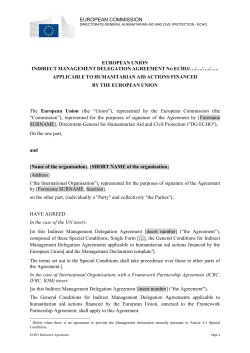
Main Grants Programme Capital Grants
Main Grants Programme Capital Grants Capital grants of £10,000 or more for work in the UK* are available through our Main Grants Programme. Capital grants are one off grants towards the purchase of equipment, or for the purchase or refurbishment of a building. Please read our Terms and Conditions of Accepting a Capital Grant before you apply. If your organisation is awarded a grant, but is not able to meet our terms and conditions, the grant will not be paid. Please pay particular attention to the need for grants to be drawn down within three years of being awarded, and that you will need to have the full balance of funding in place before payment can be made. Each of our grant programmes has separate guidelines. For information about applying for a Revenue grant through the Main Grants Programme, a Small or County grant, or for any of our other grants, please refer to the guidelines for those programmes. *including the Isle of Man and Channel Islands How to apply for a Capital grant Applications for Capital grants can be submitted at any time, provided that: you do not have an active grant from us; we are not already assessing an application to one of our other programmes; and if you applied previously and were unsuccessful, that more than 12 months has passed since you received your declination letter. There are no deadlines and we do not have an application form, but you must complete an Application Cover Sheet. This can be downloaded from our website. Mail shots and general requests for donations will not be considered. The Application Cover Sheet must be completed and submitted as part of your application. This provides us with key information; your organisation name, full contact details, the name and email address of your main contact, gives us an idea of the project or work you want us to fund, and the amount you are requesting. It also asks for confirmation that your organisation has a Child Protection Policy (if applicable to your work) and that Disclosure and Barring Checks (PVG checks in Scotland) are carried out on all staff and volunteers working with children or vulnerable people. Your application should be no longer than four sides of A4 and in font size no smaller than 11 point. Your application should describe the work your organisation undertakes, what evidence you have that it is effective, and provide details of the project you are seeking funding for. It is also important that you demonstrate an awareness of and engagement with any changes to legislation or policy which affect your field of work. Please include all the following information: Your Organisation Your organisation’s status (e.g. registered charity, company limited by guarantee, not for profit organisation or community interest company) and when it was formed. If you are a branch of, or related to, a larger organisation, explain the nature of the relationship and whether it includes any financial support. The range of services or support your organisation provides, where you operate, who you help, and why your work is needed. Please include evidence of the difference your service makes to your service users/beneficiaries (i.e. the outcomes of your work) and explain how you monitor and evaluate your work. Your Project Outline of the work you propose to undertake, or equipment you wish to purchase, and why it is needed. What existing facilities you have, how they are currently used and, if they are no longer fit for purpose, the reason for this. The activities you will deliver in the new/refurbished premises, or using the new equipment, and how your work will change or be improved as a result. The number of people who will benefit. How the project will be managed and by whom. Include information about their experience and how they are qualified for the job. How you will ensure your project is cost-effective. Your plans for monitoring and evaluating its impact. Your fundraising strategy, including details of funds already secured and applications you have made, or plan to make. Please note we will expect you to have approached local and regional funders before applying to us. If it is not appropriate to do, please tell us why. How you plan to fund any extra costs that will result from your project (e.g. because of an increase in building running costs or levels of activity) and the ongoing running costs of your organisation in the short and medium term. Please keep your application as simple as possible and avoid the use of technical language or jargon. You may include photographs or plans, but please do not send electronic media (e.g. DVDs) with your application. Your application must be signed and either printed on your organisation’s headed paper, or accompanied by a covering letter on headed paper. Referees Provide the names and addresses of two independent referees (people who do not currently benefit from your services or that will benefit from you gaining a grant, i.e. not Trustees, employees or volunteers). Supporting Documents In addition to your four page application, include a detailed budget for your project. If you are asking us for part funding, please explain where the balance of funds will be/has been raised and make it clear what has been committed to date. a budget for your organisation showing the costs of running your organisation once you have completed the capital project, and how you will meet them. your most recent audited or independently inspected accounts (full accounts are required, not just a SoFA and Balance Sheet). If the accounts show a significant surplus or deficit of income, or high reserves, please explain the reason for this. If the year end date of your accounts is more than 10 months ago, please send up-to-date management accounts as well as full accounts. How Much Can I Apply For? Over the past two years our Capital grants have ranged from £20,000 - £150,000. The amount you ask us for will depend on a range of factors, including the size of your project and your organisation. Details of grants awarded over the past three years can be found on the Recent Grants page of our website. What will happen to my application? It will take up to six months to hear the outcome of your application (though applications that are ineligible, or that are not being taken to full assessment stage will be notified before this). If an application is not signed or is received without accounts or a budget, it may be declined or returned to you unread. Please read our guidelines carefully before submitting your application. We receive many more applications than we are able to fund. Unfortunately this means that we often have to turn down good applications. Our assessment process has four stages. When we receive your application we will email you to acknowledge receipt, or write to let you know if your application does not meet our basic criteria and is therefore ineligible. We aim to do this within one week of receipt of an application. Stage One: All eligible applications are reviewed by our Grants Team. It can take up to eight weeks to conduct this assessment (although in practice you will often hear from us sooner than this). During Stage One we may contact you if we need to clarify any information in the application. The Trustees receive information about all assessed applications and may be asked to comment on them. We will be in touch at the end of the assessment to let you know whether your application will be taken forward. Stage Two: If your application is successful at Stage One, we will email you to ask for some additional financial information (e.g. management accounts and a budget for your organisation) and to request an electronic copy of your application. Again, at this stage a member of our team may contact you to seek more specific details on how you deliver your service and the number people you help. In order to minimise delays in processing your application, we aim to complete this stage of the process within two weeks so please be prepared to provide any additional information requested. Stage Three: If your application reaches this stage, one of our network of Volunteer Visitors, or a member of staff, will then contact you to arrange to visit to your organisation. The visit enables us to discuss your project with you in more detail and to find out more about your organisation and the people you work with. Visits can take up to three hours and, as well as exploring your funding request, will look more closely at your organisation’s governance, management, and fundraising strategy. We would normally expect to meet with staff and a member of your Board/Trustees. Once the visit has taken place a report is prepared for our Trustees. Stage Four: Trustees meet quarterly in March, June, September and December. Decisions about whether or not to award grants are made by Trustees at these meetings. A letter notifying you of the outcome will be sent to you within two weeks of the meeting taking place. Please note that we cannot guarantee that your application will go to a particular meeting as this is dependent on the number of applications we receive. Applicants who are unsuccessful are required to wait a minimum of 12 months from the date of notification before re-applying. We reserve the right to share with other grant makers information received from applicants requesting funding and from those in receipt of a grant from us, unless an organisation expressly requests otherwise. Knowingly providing false information will invalidate any application or grant. What we fund The Henry Smith Charity makes grants for work throughout the UK, the Isle of Man and the Channel Islands. Priority is given to work benefitting groups experiencing social and/or economic disadvantage (people with disabilities, for example) and to work that tackles problems in areas of high deprivation (by which we mean areas in the bottom third of the National Indices of Deprivation). We make grants in the categories listed below, and have given some examples of the type of work that we prioritise for support through our grants. Black, Asian and Minority Ethnic (BAME) Culturally appropriate services for Black, Asian and Minority Ethnic communities; including those that promote integration and access to mainstream services. Carers Advice and support; including respite services for carers and those who are cared for, and educational opportunities for young carers. Community Service Support services for communities in areas of high deprivation; including furniture recycling projects, debt advice services and community centres. Disability Rehabilitation, support services, training and advocacy support for people who are disabled; this includes people with learning disabilities as well as physical disabilities. Domestic and Sexual Violence Advice, support and secure housing projects for families affected by domestic violence or sexual violence. Perpetrator programmes can be considered where organisations have secured, or are working towards, Respect accreditation. We are particularly interested in services which can demonstrate their outcomes measurement such as data collected through the CAADA Insights programme. Drugs & Alcohol/Substance Misuse Rehabilitation and support services for people affected by, or at risk of, drug and/or alcohol dependency, and projects providing support to their families. Ex-Service Men and Women Support and residential care services for ex-service men and women and their dependents. Family Services Support services for families in areas of high deprivation. Healthcare Residential, health and outreach services, such as home care support. NHS operated services will not normally be funded nor will core medical staff. In the case of applications from Hospices, priority is given to requests for capital expenditure. Homelessness Advice, support and housing services for homeless people and those at risk of homelessness. Lesbian, Gay, Bisexual and Transgender Advice, support and counselling services for people who are Lesbian, Gay, Bisexual or Transgendered. Mental Health Advice and support services for people experiencing mental health problems, and projects that promote positive mental health. Older People Residential, health and emotional support services, such as befriending services and day care centres. Priority will be given to projects in areas of high deprivation and those where rural isolation can be demonstrated. Prisoners and Ex-offenders Rehabilitation and resettlement services for prisoners and/or ex-offenders; including education and training projects that improve employability, and projects that provide support to prisoners’ families. Prostitution & Trafficking Advice and support services for sex industry workers; including advice on housing support and personal health, escaping exploitation and exiting prostitution. Refugees & Asylum Seekers Advocacy, advice and support services for refugees and asylum seekers, and that help promote integration. Young People Projects and services that help maximise the potential of young people who experience educational, social and economic disadvantage; including young people in, or leaving, care. Not normally funded We do not make grants towards: General Appeals or letters requesting donations (full applications that follow our guidelines must be submitted). Local authorities, or work usually considered a statutory responsibility. Schools, colleges or universities, except for independent special schools for pupils with disabilities or special educational needs. We will not fund the following unless they are in an area of high deprivation (i.e. in the bottom third of the Indices of Deprivation): o Youth clubs o Uniformed groups such as Scouts and Guides o Community centres. Counselling projects, except those that have a clearly defined client group and are in areas of high deprivation. Pre-school projects, out of school play activities or holiday schemes, unless these are specifically for disabled children. Community transport organisations or services. Projects that promote religion (please see the Frequently Asked Questions page of our website for more information on this exclusion) Capital applications for places of worship. Organisations that do not provide direct service delivery to clients (such as umbrella, second tier or grant-making organisations). Arts projects, unless able to evidence therapeutic or rehabilitative benefits to: o older people; o disabled people; o vulnerable groups; o prisoners, or o young people experiencing educational, social and economic disadvantage (such as young people in, or leaving, care). Education projects, except those able to evidence practical and rehabilitative benefits to: o disabled people; o prisoners, or o young people experiencing educational, social and economic disadvantage. Leisure, recreation or play activities unless they: o are specifically for disabled people; o are able to demonstrate a significant rehabilitative benefit to people with mental health problems, or o significantly improve opportunities to maximise the potential of young people experiencing educational, social and economic disadvantage. One-off events (such as festivals, conferences, exhibitions and community events). The core work of Citizens Advice Bureaux. Projects that solely provide legal advice. Running costs of Hospices. Feasibility studies. Professional associations, or training for professionals. Organisations that do not have charitable aims (such as companies limited by shares and commercial companies). Start up costs, organisations that do not yet have a track record of service delivery, or that have not yet produced accounts. Individuals, or organisations applying on their behalf. Projects taking place or benefiting people outside the UK. Overseas trips. Residential holidays (except those that qualify under our Holiday Grants scheme). Heritage or Environmental conservation projects. Social research. Campaigning or lobbying projects, or general awareness raising work. Projects where the main focus is website development or maintenance. IT equipment (unless related to a member of staff we are also being asked to fund). Capital projects that are solely to meet the requirements of the Disability Discrimination Act. Capital costs towards the purchase or adaptation of a vehicle. Organisations that have applied to us unsuccessfully within the previous 12 months. Pilot projects are not currently a high priority. If you are seeking funds for a pilot project, please be aware you must be able to provide strong evidence from other work that has already been delivered to support the case for funding. You must also provide clear evidence that there is a need to develop a pilot. Checklist Please ensure that: your application is either printed on your organisation’s headed paper, or accompanied by a covering letter on headed paper that it (or the covering letter) is signed and that you have included: application cover sheet your application a budget for your project an organisational budget incorporating any additional running costs after completion of the capital project full audited or independently inspected accounts. Please send your application to: Applications - Capital The Henry Smith Charity 6th Floor 65 Leadenhall Street London EC3A 2AD These guidelines are available in large print or by email on request. Please tell us which font size you would like to receive them in, and whether you would like them posted or emailed to you. The Henry Smith Charity Charity No. 230102 Tel. 020 7264 4970
© Copyright 2025





















